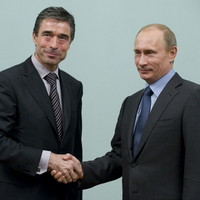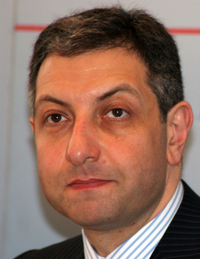At the risk of venturing pretty far down Speculation Boulevard, here’s a quick follow-up to yesterday’s post on the sale of Russian S-300 air defense systems to Iran. I mentioned that the timing of Russia trotting out its long-time political line could be meant to drive up the price of any bargain struck over UNSC sanctions. Today, a spokesman for Russian President Dmitry Medvedev refused to rule out Iran sanctions — again, nothing more than the standard Russian line. But at the same time, a Russian defense industry official stated that Russia and Saudi Arabia are finalizing an array of […]
Europe Archive
Free Newsletter

The Group of Experts assisting with the drafting of NATO’s new Strategic Concept traveled to Moscow last week, in an effort to reassure Russia about NATO and its activities. The Feb 9-11 visit followed the release of Russia’s new military doctrine, adopted on Feb. 5, which characterizes the alliance’s activities as threatening to Russia. Led by former U.S. Secretary of State Madeleine Albright, the group, consisting of a dozen members, consulted with Russian Foreign Minister Sergei Lavrov, National Security Secretary Nikolay Patrushev, and members of the Russian parliament, and held additional meetings with other Russian security experts. Albright also delivered […]

A large-scale deployment of clean energy technology is gaining speed on the global stage, causing shifts of significant geopolitical consequence. As clean energy moves from margin to mainstream, it is set to alter the balance of energy security and energy power among key regions of the world. Nations will redraw the energy map, both by assessing access to renewable resources and evaluating their traditional alliances. The degree to which frameworks are established so that clean energy drives not just competition, but also cooperation, will be key to determining the impact it ultimately has on international relations. Energy transitions take time. […]
BRUSSELS — Since the Treaty of Lisbon entered into force on Dec. 1, 2009, the European Union’s foreign policy has taken the first steps toward an institutional restructuring. Lisbon introduced a permanent president of the European Council as well as the post of high representative (HR) for foreign affairs, and established a European foreign service corps known as the European Action Service (EAS). The new positions were meant to establish more recognizable representatives of the EU in the international arena. But the relatively low profile of former Belgian Prime Minister Herman Van Rompuy and Britain’s Catherine Ashton since their election […]
At some point I’m going to make a list of foreign policy non-story stories (in which “Fatah-Hamas Agreement Imminent” will feature prominently). For now, I’ll just direct your attention to the Russian national security adviser’s declaration that nothing is “restricting” delivery of S-300 air defense systems to Iran. This is nothing more than Russia’s political line, unchanged and often-repeated ever since the contract for the sale was signed. “Unrestricted” in this case means that the S-300 system is not covered by any relevant international arms sales agreements because it is a defensive weapon. This does not suggest that delivery is […]

Whenever I ponder some of the challenges U.S. foreign policy faces today in Afghanistan, Somalia, or Yemen, I inevitably return to a passage in Bob Woodward’s “Veil,” describing how Mohammad Hussein Fadlallah, after an attempt to assassinate him had failed, was persuaded to restrain his followers in Lebanon from launching attacks on U.S. interests: The Saudis approached him and asked whether . . . he would act as their early-warning system for terrorist attacks on Saudi and American facilities. They would pay $2 million cash. Fadlallah accepted, but said he wanted the payment in food, medicine and education expenses for […]
Following President Barack Obama’s surprisingly successful question-and-answer session with GOP legislators a week or so ago, some commentators and politicians suggested that such impromptu encounters should be more frequent, comparing them with the British prime minister answering weekly questions in the British House of Commons. Judging by Monday’s White House talks between the president and the Republicans on pressing domestic issues facing the nation, the constructive tone of that earlier dialogue would seem to have been a flash in the pan. But just for the sake of argument, could there be a case for a regular public “question time” of […]
A funny thing happened on the way to the EU’s post-Lisbon era. While Herman Van Rompuy and Catherine Ashton have largely been invisible in the high-profile posts of president and foreign minister, the EU parliament decided to actually exercise some of its added powers. A few days back, I mentioned a U.S.-EU bank data-sharing agreement that, under Lisbon, needs parliamentary approval to remain in force. (Technically, the measure is a temporary bridge agreement to continue a pre-Lisbon deal until a permanent agreement can be finalized.) Today the EU parliament decided by an overwhelming majority to block the measure. What makes […]
Nariman Behravesh, chief economist at IHS Global Insight, an economic forecasting and consulting firm, tells NewsHour that Greece isn’t the only concern the EU has on its radar. Portugal, Ireland, Greece and Spain — or “PIGS” as the financially unstable group has been dubbed — are causing concern among EU officials who fear that bailouts might reinforce bad fiscal behavior while expulsion from the currency group would cause longer term damage.
“The CTBT is in big, big trouble,” said Stephen Rademaker at an East West Institute roundtable on the ever-stalled Comprehensive Nuclear Test Ban Treaty last Friday. The remark represented a rare area of consensus on what is otherwise a highly divisive issue. The EWI discussion of the CTBT and its likelihood of ratification by Congress came as a complement to a recently published report by the institute on the subject. With Rademaker, former U.S. assistant secretary of state (2002-2006) and currently senior counsel for BGR Group’s Government Affairs division, and Ambassador Robert T. Grey, Jr., director of the Bipartisan Security […]
At the Halifax International Security Forum in November of last year, maritime experts came together to discuss Arctic security. Though traditionally portrayed as a threat, the panel of experts heralded Russia as leading innovators in the region, saying that cooperation, not competition should be stressed.
At a Feb. 5 session of the Russian Security Council, President Dmitry Medvedev finally approved Russia’s updated comprehensive military doctrine, which was published on the president’s Kremlin Web site the following day. But notwithstanding a lengthy period of discussion and consideration, and despite all the developments of the past decade — including the wars in Afghanistan, Iraq and Georgia — the latest version generally supports the same policies as the previous military doctrine adopted in 2000. The doctrine depicts Russia as the target of increasing military threats emanating from NATO collectively and its members individually. It also expresses unease at […]

TBILISI, Georgia — Former U.S. President George W. Bush has a highway named after him in Tbilisi, Georgia’s charming and gritty capital, to commemorate his lofty rhetoric in praise of the Caucasian republic’s Western turn in 2003. During Bush’s visit in 2005, the president even eschewed his famous early bedtime to dance the night away in the jubilant Georgian capital. Much has changed since 2005, though. When Russian tanks rolled into Georgian territory in August 2008, Bush chose not to rise to the defense of the West’s ally in the Caucasus. But that was just the beginning. From the indignity […]
The French sale of a Mistral-class amphibious attack vessel to Russia has gotten all sorts of attention Stateside over the past few weeks, culminating in Defense Secretary Robert Gates visiting Paris in part to energetically convey the U.S. administration’s disapproval of the deal. Curiously, the deal has gotten far less coverage in the French press, even following the announcement by a French Defense Ministry official that the sale had been approved, with a Russian request for three more also under consideration. The issue warrants attention, because it gets to the heart of the odd configuration that currently characterizes U.S.-Europe-Russia relations. […]
This NY Times article on the Hatoyama government’s determination to fully expose various “secret” Cold War-era U.S.-Japan security accords seems like a timely complement to the current turbulence in U.S.-EU counterterrorism cooperation. Like the U.S.-Japan agreements, many of the U.S.-EU agreements that followed 9/11 operated either entirely covertly (black site detention centers) or else under the radar (data sharing programs), for the simple reason that they would not have withstood popular scrutiny. That kind of pragmatic trade-off, though, comes with costly deferred maintenance, as demonstrated by the Japan article. When these agreements are fully exposed and recognized, even after they’ve […]
I wrote recently about the fundamental disconnect between the “privacy versus security” trade-off that Americans are willing to make compared to Europeans when it comes to airport security. The matter at hand at the time was full-body scanners, but what I was trying to illustrate was the cultural divide between American and European perceptions of the urgency of airport security in particular and counterterrorism in general. And I think this video from an Italian journalist at L’Espresso, hosted at Le Figaro’s Web site, does a good job of backing that up. According to the article accompanying the video, the reporter […]
Secretary of State Hilary Rodham Clinton celebrated the recently signedNorthern Ireland accord that will consolidate “hard won gains of thepast decade.” Clinton says that the United States willwork to help Northern Ireland reap the benefits of peace by encouraginginternational investment and fostering continued economic growth.
